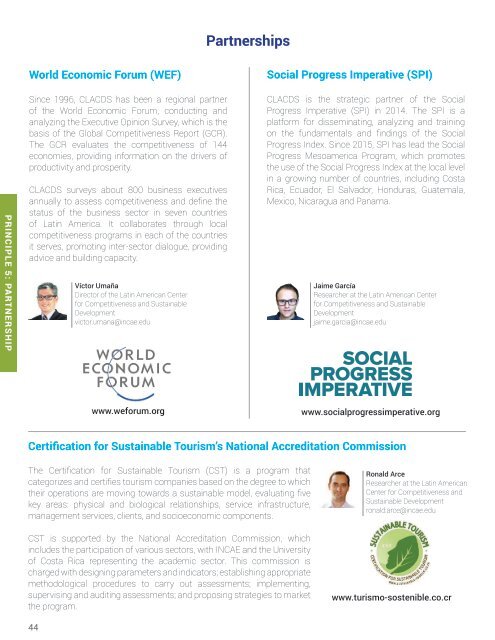INCAE ON SUSTAINABILITY
INCAEsostenible
INCAEsostenible
You also want an ePaper? Increase the reach of your titles
YUMPU automatically turns print PDFs into web optimized ePapers that Google loves.
Partnerships<br />
PRINCIPLE 5: PARTNERSHIP<br />
World Economic Forum (WEF)<br />
Since 1996, CLACDS has been a regional partner<br />
of the World Economic Forum, conducting and<br />
analyzing the Executive Opinion Survey, which is the<br />
basis of the Global Competitiveness Report (GCR).<br />
The GCR evaluates the competitiveness of 144<br />
economies, providing information on the drivers of<br />
productivity and prosperity.<br />
CLACDS surveys about 800 business executives<br />
annually to assess competitiveness and define the<br />
status of the business sector in seven countries<br />
of Latin America. It collaborates through local<br />
competitiveness programs in each of the countries<br />
it serves, promoting inter-sector dialogue, providing<br />
advice and building capacity.<br />
Víctor Umaña<br />
Director of the Latin American Center<br />
for Competitiveness and Sustainable<br />
Development<br />
victor.umana@incae.edu<br />
Social Progress Imperative (SPI)<br />
CLACDS is the strategic partner of the Social<br />
Progress Imperative (SPI) in 2014. The SPI is a<br />
platform for disseminating, analyzing and training<br />
on the fundamentals and findings of the Social<br />
Progress Index. Since 2015, SPI has lead the Social<br />
Progress Mesoamerica Program, which promotes<br />
the use of the Social Progress Index at the local level<br />
in a growing number of countries, including Costa<br />
Rica, Ecuador, El Salvador, Honduras, Guatemala,<br />
Mexico, Nicaragua and Panama.<br />
Jaime García<br />
Researcher at the Latin American Center<br />
for Competitiveness and Sustainable<br />
Development<br />
jaime.garcia@incae.edu<br />
www.weforum.org<br />
www.socialprogressimperative.org<br />
Certification for Sustainable Tourism’s National Accreditation Commission<br />
The Certification for Sustainable Tourism (CST) is a program that<br />
categorizes and certifies tourism companies based on the degree to which<br />
their operations are moving towards a sustainable model, evaluating five<br />
key areas: physical and biological relationships, service infrastructure,<br />
management services, clients, and socioeconomic components.<br />
CST is supported by the National Accreditation Commission, which<br />
includes the participation of various sectors, with <strong>INCAE</strong> and the University<br />
of Costa Rica representing the academic sector. This commission is<br />
charged with designing parameters and indicators; establishing appropriate<br />
methodological procedures to carry out assessments; implementing,<br />
supervising and auditing assessments; and proposing strategies to market<br />
the program.<br />
Ronald Arce<br />
Researcher at the Latin American<br />
Center for Competitiveness and<br />
Sustainable Development<br />
ronald.arce@incae.edu<br />
www.turismo-sostenible.co.cr<br />
44


